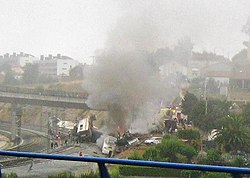| |||||
| Decades: | |||||
|---|---|---|---|---|---|
| See also: | Other events of 2013 List of years in Spain | ||||
Events of 2013 in Spain
| |||||
| Decades: | |||||
|---|---|---|---|---|---|
| See also: | Other events of 2013 List of years in Spain | ||||
Events of 2013 in Spain

12 May--Nico Rosberg - a German/Finish driver for Mercedes-Benz in Formula One won the forty-third running of the Spanish Gran Prix-held at the Circuit de Barcelona-Catalunya. Spanish driver Fernando Alonso finished fifth.
| | This section needs expansion. You can help by adding to it. (March 2013) |
| | This section needs expansion. You can help by adding to it. (October 2013) |